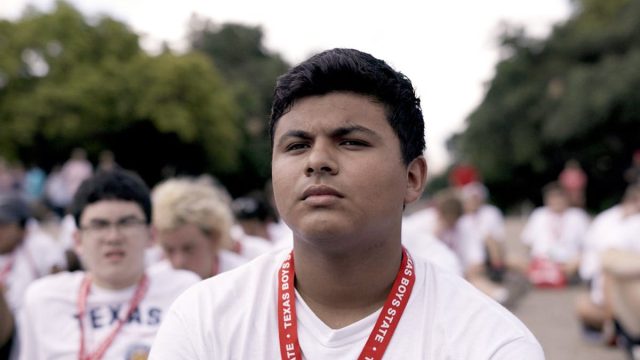Feels good to walk the streets of Colombia, Missouri once again. The weather is disconcertingly mild and the crowds may have been tempered a bit by COVID-19 (even though it has yet to reach the Midwest) but it didn’t keep a 1000+ seat venue from selling out for a documentary about a teen politics program.
That film, Boys State, is one you’ll likely hear more about, having been purchased for a record 12 million dollars by Apple when it premiered at Sundance. And it’s the only good bet this election year. Covertly using the tried and true competition formula, the movie follows the pretend politics of the Texas Boys State competition which randomly divides young male campers (there’s also a Girls State, with the filmmakers hinting at a follow up in the works) into two political parties and pits them against one another for various mock government positions.
This makes for a film as entertaining and exasperating as you’d hope. The film has found a particularly good crop of characters, including a lovable doofus who lends the film’s clear (and not undeserved) irritation with politics a surprise shot of poignancy and a young candidate with a background and oratory skills to earn an unexaggerated comparison to Obama. Michiavillian tendencies surface, naturally, and of course one is quickly swept up in the fortunes of a favorite candidate. It’s interesting to witness the kids in the film quickly swept up in arbitrary politics – candidates begin campaigning before their parties even form cogent platforms – and then be part of a crowd cheering on candidates in a movie about a fake race. It suggests the faults in our political system lie less in the fervor of the fringes and more in the elevated competition of it all. It hard to compromise, easy to root for a team.
Boys State is hopeful, for all that, ultimately becoming a worthy crowd-pleaser, less a comprehensive view of the election at its heart. Directors Amanda McBaine and Jesse Moss found the materials for a hit and wisely constructed one. It’s a surefire premise that doesn’t miss.
The festival continues its commitment to the less populist fare, however. Seven Years in May presents an account of harrowing police abuse in Brazil, including a stunning unbroken 20-some minute monologue retelling the story of young man whose life is ruined by an encounter with the local police. The account is bookended by a re-enactment and a curious game of something like “Simon Says.” The story has been co-written by a real victim but related by an actor. In cases like these, the question is whether the formal elements add to a valuable document and in this case they mostly do not. Raphael’s tale is harrowing and all too common. The film has fantastic photography but ultimately makes a decent case for it subject, less so for itself.
Starting the day with experimental shorts served to set a tone. These shorts by a Missouri native named Mike Anderson – shot in the late 70s and early 80s and projected on 16mm complete with a gloriously noisy projector – never veered from confrontation. Anderson, an African-American filmmaker, does not shy away from race issues, including a recounting of the American black experience starting from slavery completely staged in his own kitchen. Many were confrontational in their very composition. At the finish of one short time lapse with an accompanying screeching soundtrack, the gentleman to my left dryly remarked “Too bad THAT’S over.” Half the theater left at the reel change. The theater felt less crowded and the remaining viewers were rewarded with the funniest of the shorts. A time lapse of mesmerizing motion got laughs when the camera pulled back to reveal we’d been watching the filmmaker’s legs marking time in fast motion. The room relaxed, the air kicked on.
There’s nothing like a film playing to a big crowd but sometimes all you need is the right crowd.
Forgive any type0s or other nonsense, it’s quite late. Tomorrow: Kirsten Johnson kills her father over and over in Dick Johnson is Dead, the internet descends into darkness in Feels Good Man, and much more.

